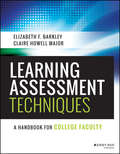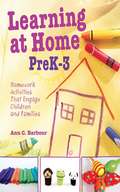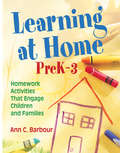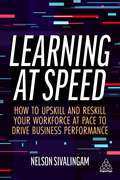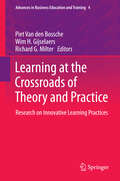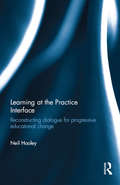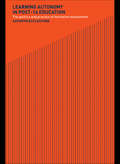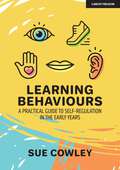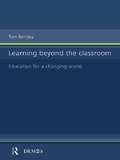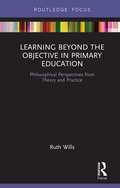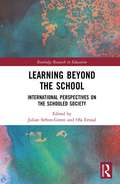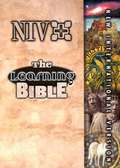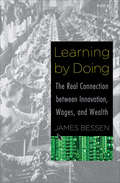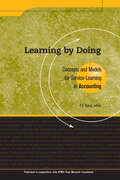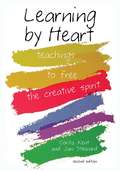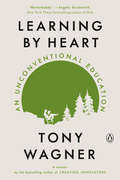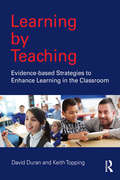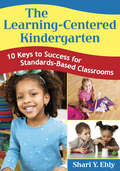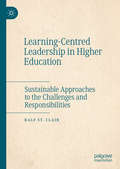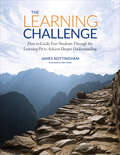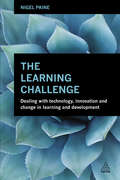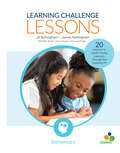- Table View
- List View
Learning Assessment Techniques
by Elizabeth F. Barkley Claire Howell Major50 Techniques for Engaging Students and Assessing Learning in College Courses Do you want to: Know what and how well your students are learning? Promote active learning in ways that readily integrate assessment? Gather information that can help make grading more systematic and streamlined? Efficiently collect solid learning outcomes data for institutional assessment? Provide evidence of your teaching effectiveness for promotion and tenure review? Learning Assessment Techniques provides 50 easy-to-implement active learning techniques that gauge student learning across academic disciplines and learning environments. Using Fink's Taxonomy of Significant Learning as its organizational framework, it embeds assessment within active learning activities. Each technique features: purpose and use, key learning goals, step-by-step implementation, online adaptation, analysis and reporting, concrete examples in both on-site and online environments, and key references--all in an easy-to-follow format. The book includes an all-new Learning Goals Inventory, as well as more than 35 customizable assessment rubrics, to help teachers determine significant learning goals and appropriate techniques. This book also provides access to a downloadable worksheet to guide teachers through the seven steps of the Learning Assessment Techniques planning and implementation cycle. College teachers today are under increased pressure to teach effectively and provide evidence of what, and how well, students are learning. An invaluable asset for college teachers of any subject, Learning Assessment Techniques provides a practical framework for seamlessly integrating teaching, learning, and assessment.
Learning at Home Pre K-3: Homework Activities that Engage Children and Families
by Ann C. BarbourFamilies play a critical role in helping young children develop a solid academic foundation and love of learning. Numerous examples have proven time and again that children's learning behavior is strongest when reinforced with activities, social interactions, and play. In Learning at Home, PreK-3, Ann Barbour stresses the importance of getting parents involved with their children's education through engaging homework activities. Bursting with activities to foster learning on many levels, this book also offers ideas for teachers on how to include parents in their children's education. Discover hundreds of fun activities designed to:Relate learning directly to children's own experiencesInclude shared reading experiences, family projects, and gamesIntegrate developmental and content areas, including language and literacy, mathematics, science, and the creative artsPromote literacy learning in homes where English is not the primary languageAnd moreThis book gives teachers the tools to reach out to families and provides parents with the guidance to reinforce learning both in school and at home. Complete with tips on how to encourage parent involvement, data to support family commitment to the child's education, and activities that young students will enjoy doing at home with their families, Learning at Home is a fantastic resource to promote the joy of learning at home.
Learning at Home, PreK–3: Homework Activities That Engage Children and Families
by Ann C. BarbourCreate a strong home-school connection through family activities that extend learning! Packed with hundreds of engaging activities, this unique resource helps teachers plan developmentally appropriate, creative homework assignments that encourage positive learning experiences and reinforce home-school connections. Focusing on social interactions within the family, these fun, playful activities: <p><p> Relate directly to children’s own experiences <p> Employ concrete, easily accessible materials <p> Include shared reading experiences, family projects, and games <p> Integrate developmental and content areas, including language and literacy, mathematics, science, and the creative arts <p> Promote literacy learning in homes where English is not the primary language
Learning at Speed: How to Upskill and Reskill your Workforce at Pace to Drive Business Performance
by Nelson SivalingamThe world is changing fast, but are you? Do you know where the skills gaps are in your organization? Do you know how to fill these gaps? Most importantly, can you make the necessary changes quickly enough to succeed?Learning at Speed is a practical book which brings together the best from lean and agile methodologies to show how they can be applied to learning and development (L&D) to improve individual and organizational performance. This provides a people development framework which can be used to deconstruct a learning strategy and optimise each element for improved results. It shows how to identify learning barriers and possible solutions, leverage company data to understand learning needs and how to assess the most effective learning resources and delivery channels. Crucially, Learning at Speed shows how to track metrics that matter, get the most from your budget and how to build a business case to get stakeholder buy-in. Understanding how to continuously upskill and reskill a workforce at speed will ensure that organizations can stay ahead of the competition. Supported by templates, worksheets, case studies, examples and practical advice, this book is the practical guide that shows learning and development (L&D) professionals how to achieve this.
Learning at the Crossroads of Theory and Practice
by Wim H. Gijselaers Piet Van den Bossche Richard G. MilterCore concepts in education are changing. For example, professional performance or expertise is not uniquely the fruit of specialist knowledge acquired at professional schools, but the sum of influences exerted by a complex web of continuous learning opportunities for which an individual is well (or ill) prepared by their schools and their workplace. The key contributory factors to professional expertise are how professional schools connect to professional practice, how schools prepare graduates for continuous learning, and how the workplace endorses continuous development. Thus, the question this volume addresses--how to design learning and working environments that facilitate the integration of these three elements--is at the heart of contemporary pedagogical theory. The authors also ask a second vital question: how do we educate learners that go on to maximize their life's learning opportunities by regulating their own ongoing learning? Learning at the Crossroads of Theory and Practice argues that with the theory of learning at a crossroads, this is an unprecedented opportunity for learning about learning. The book sheds light on different elements of this challenge: integrating theory and practice in business education, generating and fully exploiting workplace learning opportunities, and enriching our classrooms by coupling theoretical knowledge with the richness of real-life experience.
Learning at the Ends of Life
by Rachel HeydonIntergenerational learning programs bring together skipped generations (for instance, elders and young children) to promote expansive communication and identity options for participants, as well as the forging of relationships between generations. More specifically, these programs help foster multimodal literacy for both generations, encouraging new ways of seeing oneself and the world. Learning at the Ends of Life illustrates the unique benefits of these trail-blazing programs through more than seven years of research on developing and implementing intergenerational curricula in Canada and the United States.The first formal and sustained work on intergenerational curricula and literacies, Learning at the Ends of Life details the experiences of educators and participants in these programs. Rachel M. Heydon brings to life the particular possibilities of arts-based, multimodal curricula that draw on participants' existing funds of knowledge and interests. Providing practical suggestions for pedagogies and curricula, Heydon helps educators rethink what is taken for granted in monogenerational learning sites and see new possibilities for learners and themselves.
Learning at the Practice Interface: Reconstructing dialogue for progressive educational change
by Neil HooleyThis book investigates professional practice at the interface of sociology and epistemology for progressive educational change. It suggests that orthodox sociology and sociology of education have not sufficiently analysed contemporary educational situations due primarily to the strength of the economic and educational influence of neoliberalism. In drawing upon key aspects of the work of Dewey, Freire, Bernstein and Bourdieu, a new reflexive sociology of knowledge is proposed that could potentially revolutionise public schooling and emancipate learning. This critical reconceptualisation of curriculum and teaching, as well as the democratic inclusion of all children into structures of privileged and community knowledge, opens up a new epistemological stage in the sociology of education worldwide. In confronting the contradiction between social marginalisation and educational expectations, Learning at the Practice Interface explores new approaches to education systems and knowledge production. Part A raises questions regarding knowledge, pedagogy and social justice that are central to schooling and which support values weakened by neoliberalism. These values include democracy, equity, community collaboration and deference towards knowledge and culture not dependent on wealth and status. Part B explores practical issues related to how knowledge is engaged in the school curriculum. This discussion goes to the heart of learning at the practice interface and suggests that the lack of epistemological strategies based on sociological description has created serious estrangement from school knowledge for large numbers of students. Part C discusses a critical view of knowledge in relation to research, teaching and learning and the education profession generally. The need for a new reflexive sociology of knowledge is proposed to guide educational dialogue and action such that connections can be made between progressive sociology and epistemology in the interests of all children. This book will be of interest to academics and researchers in the Sociology of Education, Teacher Education, and Education Reform.
Learning Autonomy in Post-16 Education: The Policy and Practice of Formative Assessment
by Kathryn EcclestoneThis book makes an important contribution to understanding the political, social and educational impact of assessment. Using a multi-layered approach, it offers a fascinating case study of how post-16 assessment systems are designed and debated inside policy making processes. This case study highlights the broader tensions at the heart of assessment policy.The book also explores the complex factors that affect how teachers and students use formative assessment to achieve higher standards of educational attainment and more autonomous learning.Learning Autonomy in Post-16 Education is a comprehensive and authoritative account of policy and practice in post-16 assessment. The book weaves together new theoretical frameworks with evidence from empirical research to offer a detailed picture of the diverse factors affecting the quality of formative assessment in further education.The book will be of particular interest to teachers and practitioners across the post-16 sector on postgraduate and in-service professional development courses. It will also be of interest to researchers, inspectors and qualification designers.
Learning Behaviours: A Practical Guide to Self-Regulation in the Early Years
by Sue CowleyIn this book, Sue Cowley looks at the way that behaviour develops during the earliest years of a child's life, exploring how babies and young children learn behaviours and move from co-regulation to self-regulation. She gives practical advice about how to support children in learning all aspects of positive behaviour while they are in your early years setting. She explores the different behaviours that children need to learn and develop in order to be happy and successful learners in their future school careers and beyond. From learning how to share, to learning how to pay attention; from learning how to be responsible, to learning how to be kind. This book covers all these learning behaviours and much, much more.Learning Behaviours is a book full of practical strategies, realistic suggestions and down to earth advice. Sue offers a step by step guide to getting behaviour right, and a range of case studies to help you understand how the approaches work in practice. Sue Cowley is a qualified early years teacher, the author of over 30 books for teachers and an internationally renowned teacher trainer. She has helped to run her local early years setting for the last ten years.
Learning Behaviours: A Practical Guide to Self-Regulation in the Early Years
by Sue CowleyBest-selling author and qualified early years teacher Sue Cowley looks at the way that behavior develops during the earliest years of a child’s life, exploring how babies and young children learn behaviors and move from co-regulation to self-regulation. Learning Behaviors gives practical advice about how to support children in learning all aspects of positive behavior while they are in your daycare, preschool or kindergarten. Sue explores the different behaviors that children need to learn and develop in order to be happy and successful learners in their future school careers and beyond. From learning how to share to learning how to pay attention; from learning how to be responsible to learning how to be kind – this book covers all these learning behaviors and much more.This is a book full of practical strategies, realistic suggestions and down-to-earth advice. Sue offers a step-by-step guide to getting behavior right, and a range of case studies to help you understand how the approaches work in practice.
Learning Beyond the Classroom: Education for a Changing World
by Tom BentleyEducation has become one of our major concerns, at the heart of any strategy for prosperity and social cohesion. But young people are having more difficulty than ever before in adapting to the world they will enter as adults.Tom Bentley argues that if education is to meet the emerging challenges of the twenty-first century, we must recognise that learning takes place far beyond the formal education sector. We cannot rely solely on dedicated teachers to deliver the understanding and personal qualities young people will need. Instead we must connect what happens in schools to wider opportunities for learning. Drawing on a wide-ranging review of educational innovation and on contemporary analysis of economic, social and technological change, this book shows that creating an education revolution requires us to think far more radically about young people and the options for reform, and outlines a vision of education fit for the twenty-first century.Tom Bentley is a senior researcher at Demos, the independent think-tank. He was born and educated in East London and at Oxford University. His research areas include: young people, education, the future of work and combating of social exclusion.
Learning Beyond the Objective in Primary Education: Philosophical Perspectives from Theory and Practice
by Ruth WillsLearning Beyond the Objective in Primary Education explores an existential perspective for pedagogy proposed in response to the current technocratic paradigm of education prevalent in many countries worldwide. This new perspective is termed ‘Bildung’s Repetition.’ The book seeks to encourage policy makers and educational practitioners to consider the impact of education on children, over and above the meeting of set targets and objectives. Located in a philosophical framework, this book considers how children might learn authentically in the light of their own personal contingency. A series of case studies reflecting the effectiveness of this perspective through the curriculum is provided, each illustrating how ‘Bildung’s Repetition’ allows for personalized meaningful learning within current structures. Recommendations for practice are provided, encouraging all stakeholders in education to consider the value of this perspective, and effect a ‘ten-degree shift’ within educational thought. This unique book fuses theory with practice, and will be of great interest to academics, researchers and students in the fields of primary education and teacher training. It will also be of interest to school leaders and practicing teachers.
Learning Beyond the School: International Perspectives on the Schooled Society (Routledge Research in Education)
by Julian Sefton-Green Ola ErstadWhilst learning is central to most understandings of what it is to be human, we now live in a knowledge society where being educated defines life chances more than ever before. Learning Beyond the School brings together accounts of learning from around the world in organisations, spaces and places that are schooled, but not school. Exploring examples of learning organisation, pedagogisation, informal learning and social education, the book shows not only how understandings of education are framed in terms of local versions of schooling, but what being educated could and should mean in very different social and political contexts. With contributions from scholars based in Australia, Europe, the USA, Latin America and Asia, the book brings together accounts of learning outside of school. Chapters contain rich and detailed case studies of innovative projects, new kinds of learning institutions, youth, peer-driven and community-based activities and public pedagogies, as well as engaging with the dimensions of an argument about the place and nature of learning outside of the school. It challenges dominant versions of school around the world, whilst also critically discussing the value and place of non-institutionalised learning. Learning Beyond the School should be of interest to academics, researchers, postgraduate scholars engaged in the study of comparative education, youth work, education systems, digital culture, sociology of education and youth development. It should also be essential reading for practitioners and policymakers who are interested in youth and education system reform.
The Learning Bible (New International Version)
by American Bible SocietySince the publication of "The Learning Bible"--a full-color, easy-to-use and fun-to-read study Bible--the American Bible Society has been working on an NIV version, which is available this spring. With hundreds of charts, maps, and full-color photos and illustrations, this new Bible is sure to be a bestseller.
Learning by Doing: The Real Connection between Innovation, Wages, and Wealth
by James Bessen&“Bessen sets out to refute the arguments of . . . techno-pessimists, relying on economic analysis and on a fresh reading of history&” (The Wall Street Journal). Technology is constantly changing our world, leading to more efficient production. But where once technological advancements dramatically increased wages, the median wage has remained stagnant over the past three decades. Many of today&’s machines have taken over the work of humans, destroying old jobs while increasing profits for business owners and raising the possibility of ever-widening economic inequality. Here, economist and software company founder James Bessen discusses why these remarkable advances have, so far, benefited only a select few. He argues the need for unique policies to develop the knowledge and skills necessary to implement rapidly evolving technologies. Currently, this technical knowledge is mostly unstandardized and difficult to acquire, learned through job experience rather than in classrooms, but labor markets rarely provide strong incentives for learning on the job. Basing his analysis on intensive research into economic history as well as today&’s labor markets, Bessen explores why the benefits of technology can take decades to emerge. Although the right policies can hasten the process, policy has moved in the wrong direction, protecting politically influential interests to the detriment of emerging technologies and broadly shared prosperity. This is a thoughtful look at what leaders need to do to ensure success not only for the next quarter, but for society in the long term. &“Everyone agrees that education is the key to wage growth. But what kind of education? . . . This enlightening and insightful book . . . shows that economic history can provide some useful and surprising answers.&” —Hal Varian, chief economist at Google
Learning By Doing: Concepts and Models for Service-Learning in Accounting
by D. V. Rama Edward ZlotkowskiThe fifth volume in a AAHE and Campus Compact’s series on service-learning in the disciplines, this volume focuses on curriculum reform in accounting programs based on goals identified by accounting educators and describes specific implementations across the accounting curriculum. A practical guide with real solutions for both accounting educators and students.
Learning by Heart: Teachings to Free the Creative Spirit
by Corita Kent Jan StewardTap into your natural ability to create!* Engaging, proven exercises for developing creativity* Priceless resource for teachers, artists, actors, everyoneArtist and educator Corita Kent inspired generations of artists, and the truth of her words "We can all talk, we can all write, and if the blocks are removed, we can all draw and paint and make things" still shines through. This revised edition of her classic work Learning by Heart features a new foreword and a chart of curriculum standards. Kent's original projects and exercises, developed through more than 30 years as an art teacher and richly illustrated with 300 thought-provoking images, are as inspiring and as freeing today as they were during her lifetime. Learn how to challenge fears, be open to new directions, recognize connections between objects and ideas, and much more in this remarkable, indispensable guide to freeing the creative spirit within all of us. With new material by art world heavyweights Susan Friel and Barbara Loste, Learning by Heart brings creative inspiration into the 21st century!
Learning by Heart: An Unconventional Education
by Tony Wagner&“A page turner. With candor and clarity, Tony Wagner tells the story of his remarkable life and, in so doing, tells the story of our education system.&”—Angela Duckworth, Founder and CEO, Character Lab, and New York Times bestselling author of GritOne of the world's top experts on education delivers an uplifting memoir on his own personal failures and successes as he sought to become a good learner and teacher.Tony Wagner is an eminent education specialist: he has taught at every grade level from high school through graduate school; worked at Harvard; done significant work for the Bill & Melinda Gates Foundation; and speaks across the country and all over the world. But before he found his success, Wagner was kicked out of middle school, expelled from high school, and dropped out of two colleges. Learning by Heart is his powerful account of his years as a student and teacher. After struggling in both roles, he learned to create meaningful learning experiences despite the constraints of conventional schooling--initially for himself and then for his students--based on understanding each student's real interests and strengthening his or her intrinsic motivations. Wagner's story sheds light on critical issues facing parents and educators today, and reminds us that trial and error, resilience, and respect for the individual, are at the very heart of all teaching and learning.
Learning by Teaching: Evidence-based Strategies to Enhance Learning in the Classroom
by David Duran Keith ToppingThis book provides an essential overview of "learning by teaching", unpacking the underpinning theory, research evidence and practical implications of peer learning in a variety of classroom contexts. It aims to offer practical guidance for practitioners in structuring effective peer learning – between professionals and between students alike. It locates this phenomenon in current conceptions of learning and teaching, far removed from traditional ideas of one-way transmission of knowledge. Exactly what happens to promote learning by teaching is explored. Examples of learning by teaching are discussed and it is noted that this happens in school, university and the workplace, as well as through the Internet. Learning by teaching within the student body is then explored, and many different methods described. The organizational features needed to improve learning by teaching consciously and deliberately are investigated. These can be before teaching, during teaching or after teaching. Evidence-based practical guidance is given. Of course teachers can deploy learning by teaching for themselves, but what if they also organize their students to teach each other, thereby giving many more opportunities to discuss, practise, explain and question? This takes pedagogical advantage of the differences between students – turning classrooms into communities of learners where students learn both from their teacher and from their peers.
The Learning-Centered Kindergarten: 10 Keys to Success for Standards-Based Classrooms
by Shari Y. EhlyThis innovative book helps kindergarten teachers align learning-centered practices with state standards and offers classroom vignettes, practical strategies, lesson plans, and other essential resources.
Learning-Centred Leadership in Higher Education: Sustainable Approaches to the Challenges and Responsibilities
by Ralf St. ClairThis book explores the implications of focusing learning in university leadership. While a range of external and internal factors push contemporary higher education leaders towards a reactive and transactional style, the author argues that placing learning at the centre of the decision-making process ultimately grounds higher education leadership in values. Illustrated by numerous case studies and informed by Peter Senge’s theory of learning, the author examines this central thesis across a variety of areas and functions of higher education that are vital to the development and success of this shared endeavour. This book will be of interest and value to both new and established university leaders, as well as scholars of leadership in higher education more generally.
The Learning Challenge: How to Guide Your Students Through the Learning Pit to Achieve Deeper Understanding (Corwin Teaching Essentials)
by James A. NottinghamEmbrace challenge and celebrate Eureka! Challenge makes learning more interesting. That’s one of the reasons to encourage your students to dive into the learning pit—a state of cognitive conflict that forces students to think more deeply, critically, and strategically until they discover their “eureka” moment. Nottingham, an internationally known author and consultant, will show you how to promote challenge, dialogue, and a growth mindset through: Practical strategies that guide students through the four stages of the Learning Challenge Engaging lesson plan ideas and classroom activities Inspiring examples from Learning Challenges across the world
The Learning Challenge: How to Guide Your Students Through the Learning Pit to Achieve Deeper Understanding (Corwin Teaching Essentials)
by James A. NottinghamEmbrace challenge and celebrate Eureka! Challenge makes learning more interesting. That’s one of the reasons to encourage your students to dive into the learning pit—a state of cognitive conflict that forces students to think more deeply, critically, and strategically until they discover their “eureka” moment. Nottingham, an internationally known author and consultant, will show you how to promote challenge, dialogue, and a growth mindset through: Practical strategies that guide students through the four stages of the Learning Challenge Engaging lesson plan ideas and classroom activities Inspiring examples from Learning Challenges across the world
The Learning Challenge
by Nigel PaineThe landscape of workplace learning is transforming. Organizations today understand that formal training is not always the best solution in the fast changing world of innovation and new technology. The rise of social and informal learning, gamification of training, dealing with big data and working with extended enterprise are just some challenges L&D professionals face in their work today. The Learning Challenge helps practitioners to make sense of the latest developments in this area and the impact they have on the learning function in their organization. With the help of case studies and interviews from a range of high profile practitioners, The Learning Challenge defines the role the new learning leader and illuminates the practical implications for creating and implementing a learning strategy for the 21st century.
Learning Challenge Lessons, Elementary: 20 Lessons to Guide Young Learners Through the Learning Pit (Corwin Teaching Essentials Ser.)
by Jill Nottingham James NottinghamJumpstart meaningful learning for students with new Learning Challenge lessons Twenty new lessons, created to accompany The Learning Challenge, provide teachers with everything needed to run thoughtful, dialogue-driven challenges for elementary school students. Each compelling and developmentally-appropriate lesson invites young students to think, to be reasonable, to make moral decisions, and to understand another person’s point of view—all critical skills in today’s complex world. Detailed lesson plans help teachers facilitate rigorous discussion around topics of current importance and include activities and techniques that encourage students into the “Learning Pit” to explore ideas and uncertainties with others through dialogue.
